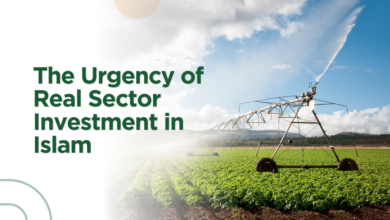Islamic Economics
-

Check Again! Is your Debt a Blessing or a Curse?
Many people believe that debt is an essential component of contemporary life. We can accomplish goals that might otherwise be unattainable by borrowing money whether it be through business financing, credit cards, mortgages or student loans. But at what point does beneficial debt become a financial trap?The Quran forbids reckless borrowing and extravagant spending. As the evidence Surah Al-Isra verse…
Read More » -

How to Avoid FOMO in Investment
Investing is now easier than ever in the digital age. Anybody can purchase stocks, cryptocurrencies or mutual funds with a few smartphone taps. FOMO or the fear of missing out is one of the most prevalent psychological issues brought on by this convenience. In the context of investing FOMO is the emotional reaction that occurs when we observe others appear…
Read More » -

Business Partners Split? A Test of Syirkah Trust
Building a business with friends, relatives, or colleagues that you trust as business partners is like riding a boat together: if the oars are not in tune, the direction can be unstable. Especially if someone starts to be dishonest, the boat could sink, trust will be shattered, and the partnership will end. In fact, in Islam, partnership or partnership is…
Read More » -

Mountains of Gold Don’t Stop the Desire to Accumulate Wealth
Have you ever bought a new cellphone, but a week later you feel like upgrading it again? Or have you just received a work bonus, but your mind is already running to installments for a new car, vacations, or branded goods that weren’t that urgent before? That’s a small example of one big problem: the desire to accumulate wealth that…
Read More » -

What is the View on Islam and Morals of Stockpiling?
Have you ever thought about why some people’s wealth continues to increase, while on the other hand there are those who have difficulty even eating? Or, why is Islam so “sensitive” when it comes to wealth being kept and not being used? Well, this is where it is important for us to talk about stockpiling meaning not only from an…
Read More » -

Uncovering Hidden Sins in the World of Product Marketing
Have you ever bought something because you were tempted by the advertisement, but it turned out to be a dud? Or maybe you yourself are selling, then think: “If we don’t promote it a little bit more, it’ll be hard to sell…” Especially now, buying and selling used goods in the marketplace is getting busier. Not a few claim that…
Read More » -

Profit Sharing or Usury? Know the Difference from the Start
Have you ever heard someone say, “Relax, this is a sharia investment. The profit sharing system, not interest.” It sounds really sweet, like it’s definitely halal, safe, and blessed. But… wait a minute. Are all those who claim to “profit sharing” automatically free from usury? Not necessarily. Because in fact, there are so many investment practices that claim to be…
Read More » -

Patience as a Virtue of a Muslim Investor
Patience is a mental anchor that determines ones success or failure in the world of investing not just a tactic. Patience has two qualities for a Muslim investor: it protects against market swings and reflects Islamic morality and faith. One of the fundamental virtues of Islam praised by Allah ﷻ and the Prophet Muhammad ﷺ is patience (sabr) which is…
Read More » -

The Urgency of Real Sector Investment in Islam
Since it represents concrete economic activities like production, trade and services, the real sector forms the basis of any economy. From an Islamic standpoint, real sector investments are not only welcomed but also seen as being more in line with Shariah values which place a strong emphasis on expediency, sustainability and justice. Unlike the speculative instruments found in the traditional…
Read More » -

The Urgency of Having a Long-Term Vision in Investing
In today’s unpredictable economic environment investing with a long-term vision is not only a strategy but a need. Investors frequently feel pressured to respond to daily fluctuations in the market particularly when news headlines exacerbate anxiety. Short-term responses however usually cause more harm than good over time. Investors can avoid emotional blunders stay focused on their long-term financial objectives and…
Read More »

